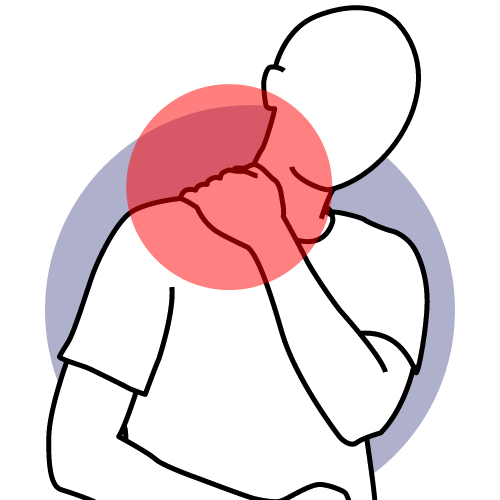Shoulder Pain Dallas

Shoulder Pain Treatment Dallas, TX
Shoulder pain can significantly impact your daily life, affecting your ability to work, sleep, and perform routine activities. At Innovative Therapy PC in Dallas, TX, we specialize in providing expert shoulder pain treatment to help you find relief and improve your quality of life.
Our team of experienced healthcare professionals includes physical therapists, and pain management experts dedicated to delivering compassionate care and effective treatment options tailored to your needs.
We understand that shoulder pain can stem from various causes, including muscle strains, rotator cuff injuries, tendonitis, bursitis, arthritis, and shoulder impingement syndrome. That’s why we take a comprehensive approach to care, combining advanced diagnostic techniques with evidence-based treatments to address the root cause of your pain and promote healing.
Our treatment options for shoulder pain may include physical therapy, medication management, corticosteroid injections, regenerative medicine therapies, and minimally invasive procedures. Whether you’re dealing with acute injuries, chronic conditions, or degenerative diseases of the shoulder, we have the expertise and resources to help you find relief and restore function.
Don’t let shoulder pain hold you back any longer. Contact Innovative Therapy PC today to schedule a appointment with one of our shoulder pain specialists and take the first step towards a pain-free future.
Shoulder Pain Doctors Dallas

If you’re searching for experienced shoulder pain doctors in Dallas, or DFW areas, look no further than Innovative Therapy PC. Our board-certified physicians and specialists are leaders in orthopedic medicine, with extensive experience and expertise in diagnosing and treating shoulder conditions.
From acute injuries to chronic degenerative diseases, we offer personalized treatment plans tailored to your needs and goals. Our comprehensive approach to care combines conservative therapies, advanced interventions, and rehabilitation techniques to provide superior outcomes for our patients.
At Innovative Therapy PC, we prioritize patient education, communication, and support, ensuring you are actively involved in your treatment plan every step. We’ll work with you to develop a customized plan that addresses your unique needs and helps you achieve your desired outcomes.
Don’t let shoulder pain limit your activities or diminish your quality of life. Choose Innovative Therapy PC for expert care and personalized attention that you can trust. Contact us today to schedule a consultation and experience the difference for yourself.
Shoulder Pain Treatment & Specialists - Dallas, TX
When it comes to finding effective shoulder pain treatment and specialists in Dallas, TX, Innovative Therapy PC is your trusted partner. Our team of dedicated healthcare professionals specializes in diagnosing and treating various shoulder conditions, from acute injuries to chronic degenerative diseases. We offer personalized care plans tailored to your needs and goals using state-of-the-art diagnostic techniques and evidence-based treatments.
Whether you’re dealing with rotator cuff injuries, tendonitis, bursitis, arthritis, or other shoulder issues, our experts are here to help you find relief and restore function. At Innovative Therapy PC, we understand shoulder pain’s impact on your daily life, which is why we prioritize compassionate care and patient satisfaction. Don’t let shoulder pain hold you back any longer. Contact us today to schedule a consultation and take the first step towards a pain-free future.
Why Choose Innovative Therapy PC?
Innovative Therapy PC stands out as a leader in providing expert care for shoulder pain in Dallas, Texas. Here are just a few reasons why you should choose us for your shoulder pain treatment:
- Expertise: Our team of board-certified physicians and specialists are leaders in orthopedic medicine, with extensive experience and knowledge in diagnosing and treating shoulder conditions.
- Comprehensive Care: From conservative treatment to advanced interventions, we offer a full spectrum of services to address a wide range of shoulder issues, including acute injuries, chronic conditions, and degenerative diseases.
- Patient-Centered Approach: At Innovative Therapy PC, we prioritize patient education, communication, and support, ensuring that you are actively involved in your treatment plan every step of the way.
- Cutting-Edge Technology: We utilize the latest advancements in medical technology and surgical techniques to ensure optimal outcomes and faster recovery times for our patients.
- Convenient Location: Our conveniently located office in Dallas, Texas, makes it easy to access the care you need close to home.
Don’t let shoulder pain limit your activities or diminish your quality of life. Choose Innovative Therapy PC for expert care and personalized attention that you can trust. Contact us today to schedule a appointment and experience the difference for yourself.
Shoulder Pain Dallas
Regain mobility and wave goodbye to shoulder pain with our expert care in Dallas.

Shoulder Pain Dallas, TX
Regain mobility and wave goodbye to shoulder pain with our expert care in Dallas, TX.
“Shoulder frequently indicates we are carrying a burden that doesn’t belong to us.”
We can develop a customized plan that includes exercises and stretches specifically designed to target your shoulder pain. In addition, we can give you guidance on how to modify your daily activities to avoid further aggravating your shoulder.
Shoulder bursitis is a condition that results when the bursa in the shoulder becomes irritated and inflamed. Physical therapy can help to reduce pain and inflammation, and it can also help to improve your range of motion and strength. Exercises that stretch and strengthen the muscles around the shoulder can be especially helpful in alleviating pain.
Bicipital tendinitis is a condition that results when the tendons in the shoulder become irritated and inflamed. Physical therapy can help to reduce pain and inflammation, and it can also help to improve your range of motion and strength. Exercises that stretch and strengthen the muscles around the shoulder can be especially helpful in alleviating pain.
Slap lesions are a type of injury that can cause pain, inflammation, and loss of range of motion. Physical therapy can help to reduce pain and inflammation, and it can also help to improve the range of motion and strength. Exercises that stretch and strengthen the muscles around the shoulder can be especially helpful in alleviating pain.
Labral tears are a type of injury that can cause pain, inflammation, and loss of range of motion. Physical therapy can help to reduce pain and inflammation, and it can also help to improve the range of motion and strength. Exercises that stretch and strengthen the muscles around the shoulder can be especially helpful in alleviating pain.
Supraspinatus tendonitis is a condition that results when the tendons in the shoulder become irritated and inflamed. Physical therapy can help to reduce pain and inflammation, and it can also help to improve your range of motion and strength. Exercises that stretch and strengthen the muscles around the shoulder can be especially helpful in alleviating pain.
Shoulder Ailments That I Treat
FAQs About Shoulder Pain Dallas
What are two warning signs of a rotator cuff tear?
Two warning signs of a rotator cuff tear include persistent shoulder pain, significant when raising or lowering your arm, and weakness in the shoulder or arm. It could indicate a rotator cuff tear if you experience difficulty lifting objects or performing daily activities due to weakness or pain. Additionally, you may notice a clicking or popping sensation in the shoulder joint. If you suspect a rotator cuff tear, you must seek evaluation from a healthcare professional for proper diagnosis and treatment.
How can I tell if shoulder pain is severe?
Shoulder pain can be considered severe if it persists despite rest and conservative treatments, is accompanied by weakness or numbness in the arm or hand, or is associated with trauma or injury. Other warning signs of severe shoulder pain include:
- Difficulty moving the shoulder joint.
- Swelling or bruising around the shoulder.
- Pain that worsens at night or interferes with sleep.
If you experience any of these symptoms, it’s important to seek evaluation from a healthcare professional to determine the underlying cause and appropriate treatment.
What is a red flag for shoulder pain?
A red flag for shoulder pain is persistent pain or weakness in the shoulder that does not improve with rest or over-the-counter medications. Other red flags include swelling, bruising, or deformity of the shoulder joint, difficulty moving the shoulder, and pain that radiates down the arm or into the neck. If you experience any of these symptoms, you must seek prompt evaluation from a healthcare professional to rule out severe underlying conditions such as a rotator cuff tear, shoulder impingement, or shoulder dislocation.
Why you shouldn't ignore shoulder pain?
Ignoring shoulder pain can lead to worsening symptoms, decreased range of motion, and potential long-term damage to the shoulder joint. Shoulder pain can be indicative of underlying conditions such as rotator cuff tears, shoulder impingement, or arthritis, which may require timely intervention for optimal outcomes. Delaying treatment can lead to chronic pain, decreased function, and even disability in severe cases. Seeking prompt evaluation and treatment for shoulder pain can help alleviate symptoms, prevent complications, and improve your quality of life.
When should you not ignore shoulder pain?
You should not ignore shoulder pain if it persists for more than a few days, is severe or debilitating, or is accompanied by other concerning symptoms such as weakness, numbness, or difficulty moving the shoulder joint. Additionally, if the pain is the result of trauma or injury, it’s important to seek evaluation from a healthcare professional to rule out severe conditions such as fractures or dislocations. Ignoring shoulder pain can lead to worsening symptoms and potential long-term damage to the shoulder joint, so it’s essential to seek timely evaluation and treatment for persistent or severe pain.
What are the most common shoulder injuries that lead to shoulder pain in Dallas, Texas?
Shoulder injuries can vary, but some of the most common ones include rotator cuff tears, shoulder arthritis, dislocations, and fractures.
How can physical therapy help with shoulder joint pain in Dallas?
Physical therapy can help alleviate shoulder joint pain by strengthening the muscles around the shoulder, improving flexibility, and reducing inflammation.
How can physical therapy help with shoulder joint pain in Dallas?
Physical therapy can help alleviate shoulder joint pain by strengthening the muscles around the shoulder, improving flexibility, and reducing inflammation.
What are the signs of shoulder arthritis, and how is it treated in Dallas?
Signs of shoulder arthritis include stiffness, swelling, and persistent pain. Treatment often involves physical therapy, medication, and, in some cases, surgery.
Can a rotator cuff injury be treated without surgery in Dallas, Texas?
Many rotator cuff injuries can be treated with physical therapy, rest, and anti-inflammatory medications. Surgery is usually considered if conservative treatments fail.
What should I expect during my first appointment for shoulder pain at Innovative Therapy PC in Dallas?
During your first appointment, our team will thoroughly assess your shoulder, discuss your symptoms, and develop a personalized treatment plan.
How long does it typically take for patients to recover from shoulder surgery with physical therapy in Dallas?
Recovery time varies depending on the severity of the injury and the type of surgery. Physical therapy can expedite healing and help patients regain strength and mobility.
What role does the Innovative Therapy PC team play in treating shoulder pain in Dallas?
Our team of expert physical therapists specializes in diagnosing and treating shoulder pain, providing personalized care and support throughout your recovery journey.
Can physical therapy prevent the need for shoulder surgery in some patients in Dallas?
Yes, in many cases, physical therapy can effectively treat shoulder injuries and conditions, potentially eliminating the need for surgery.
